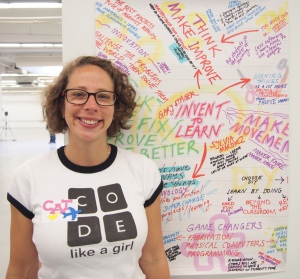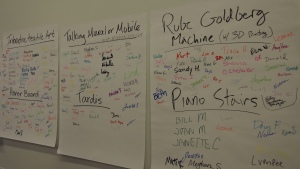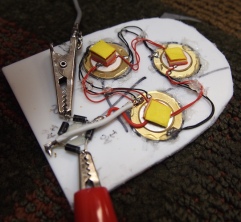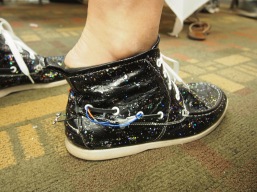Constructing Modern Knowledge is a hands-on workshop run in Manchester, New Hampshire by Gary Stager and Sylvia Martinez (authors of the popular book Invent to Learn). They have a supporting crew of loads of people with a background in education, edTech and making things. Some of whom include Cynthia Solomon, Eric Rosenbaum, Brian Silverman, Dan and Molly Lynn Watt, Brian Harvey and Brian Smith.
CMK is unlike any conference or workshop I have been to before, the aim is for people to engage in experiential learning by being thrown into a project and engaging problem solving and collaboration skills to develop an idea. The ideas people came up with were all kinds of crazy.
Being a fan of clean energy, I chose to work on the Energy Generating Shoe. Our project team was made up of Tracie, Kurt, Mindy, Craig, Bri, Doug and I (Rob worked with us for some of the time before choosing to work on a project more in line with his interests). Our collective backgrounds included elementary and middle school teachers and an amazing librarian who has a really cool makerspace. Though we had some people with experience in science, math, programming and making, none of us had a background in electronics, which certainly set the tone for the challenge to come.
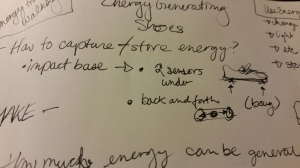 We started with some sketches and a MindMap. We also spoke to some of the support staff to gather some ideas. We had two main ideas for generating energy: the use of a coil and magnet and the use of piezoelectric (drum kit) transducers. We tested the coil and magnet idea but were not able to generate any energy; in addition it wasn’t a practical solution for a shoe. The piezoelectric drum kit components were small, flat and round and responded to pressure – perfect for taking advantage of the heel strike of someone walking or running.
We started with some sketches and a MindMap. We also spoke to some of the support staff to gather some ideas. We had two main ideas for generating energy: the use of a coil and magnet and the use of piezoelectric (drum kit) transducers. We tested the coil and magnet idea but were not able to generate any energy; in addition it wasn’t a practical solution for a shoe. The piezoelectric drum kit components were small, flat and round and responded to pressure – perfect for taking advantage of the heel strike of someone walking or running.
Once we discovered we could generate energy we needed to look at how to capture the energy. After discussion and more research we developed a diode bridge to allow the electricity to pass through to a capacitor, without any of the electricity flowing backwards and getting lost.
From that point we were attempting to program the arduino boards and lilypad boards to create funky led light presentations to use the generated energy. But after two days with very limited success (part of the problem was that some kits had been muddled up and we had the wrong cables and other such issues), we ran out of time and simply wired the shoe to a small switch and led lights.
Honestly we felt fairly lost for the majority of the project and it was very slow going. With help from the internet and the people around us (not to mention a quick phone-a-friend to my electronics teacher friend Charlie) we managed to exceed expectations and produce a functional prototype.
Despite knowing we had tackled a hard project, we felt a little inadequate that we only had something small to show for all our time and effort, so we painted our shoes sparkly colours, we bought some gloves and gave them some bling too, including a very basic sewable set of LED lights. We blinged our presentation with sparkles and a Michael Jackson style dance performance.
The experience taught me that I can achieve more than I think when I put my mind to it, but I found it a very uncomfortable place to be. Most of the time I felt useless and wanted to run away (and some people did leave the workshop early). It’s not a learning style that I feel comfortable with. I prefer more guided instruction, but what kind of a teacher would I be if I didn’t give it a whirl and put myself in the shoes of a student.
One of the key take aways from this experience is that it’s important for students to try and figure out solutions themselves, to have challenging goals and learn how to persevere with a problem. To learn how to research and collaborate with others to achieve a goal, without receiving the direct instruction that encourages rote learning rather than understanding. While my friend Charlie has explained concepts of electricity and circuit design to me a million times before, none of it made sense until I had to construct something that used the concepts. I do feel though, that if I was to attempt something similar, I would provide mini-sessions for how to get started with things, certainly things like arduino boards.
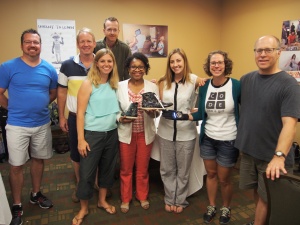 In addition to all the challenging learning experiences, I made fantastic new friends and brilliant contacts with passionate educators that will enable collaboration, to benefit learners globally.
In addition to all the challenging learning experiences, I made fantastic new friends and brilliant contacts with passionate educators that will enable collaboration, to benefit learners globally.
